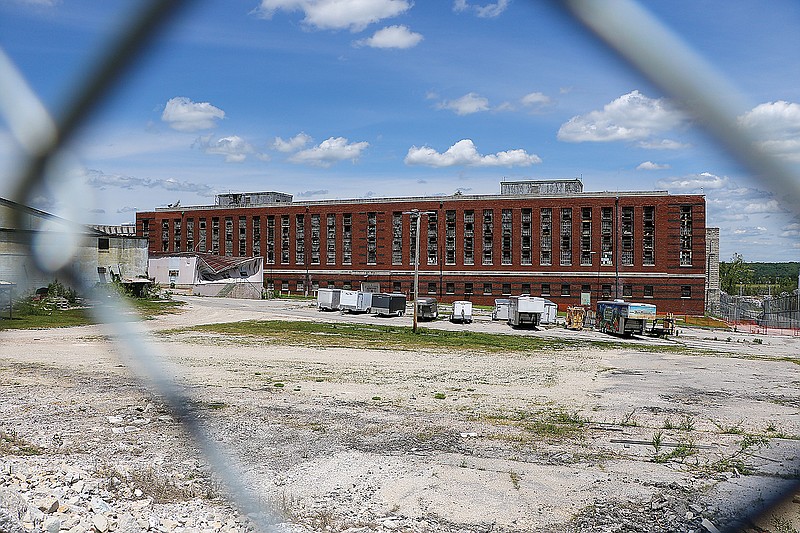In a close vote Monday, the Jefferson City Council approved a resolution to move forward with one developer for the Missouri State Penitentiary site.
The council voted 6-4 in approval of a resolution to select the St. Louis-based group made up of Chesterfield Hotels, architecture and design firm Arcturis, Peckham Architecture and Central Missouri Professional Services.
The resolution moves the process forward with the group to begin more specific negotiations on the redevelopment. This does not create a contract or formal agreement with the developer at this time.
The resolution states the council and developer have until the end of the calendar year to create a redevelopment agreement. If no agreement is made by Dec. 31, the resolution expires. The deadline can be extended by the council.
The Chesterfield/Arcturis group proposal divides the land into eight "redevelopment project areas." Some of these would come in later phases or could be developed by other groups.
RPA 1 - the section behind the historic prison buildings near the Missouri River - would include a 150-room Tapestry by Hilton Hotel, conference center and parking garage.
RPA 2-A, next to RPA 1, would include a city-owned, two-sheet ice arena and parking garage, while RPA 2-B, just south of 2-A, would be developed by another developer into a mixed-use and retail space with an expo center expansion in phase two.
RPA's 3-A and 3-B - on the far east side of the property and also partially along the river - would be developed by others, with proposed uses being a museum, mixed use/commercial and a train station.
RPA's 4-A and 4-B - located around the existing MSP buildings and up to East Capitol Avenue - would also be developed by others. Proposed uses include residential town homes and an office building. In 4-C, the group is proposing a place-making and amphitheater space; however, RPA 4-C is not currently owned by the city.
Council members Ron Fitzwater, Rick Mihalevich, Hank Vogt, David Kemna, Mark Schreiber and Laura Ward voted in favor of the resolution.
The council members who support the plan have previously praised the variety of uses the Chesterfield plan proposes. The public also widely supported the plan, particularly the inclusion of the ice arena.
Ward 2 Councilman Rick Mihalevich, who has been involved in redevelopment discussions for years, gave his support for the Chesterfield proposal ahead of the vote, based partially on the potential capital investment of the developer.
"I know I have a lot of skepticism about the finances of this thing, but if owner equity of $27 million means that (the developer) thinks it's feasible, then I might nod my head and say they know something about spending their money in a way that I don't," Mihalevich said.
Ward 1 Councilman David Kemna said the Chesterfield group more closely met the intent and vision the state had when it conveyed the land to the city in 2018.
"In conversations going forward, I think most people would like to see how that would unfold," Kemna said.
Although Mayor Carrie Tergin's tiebreaking vote was not needed, she also gave support for the Chesterfield proposal, and celebrated the council's decision to move forward with development of the site while thanking both developers for their work.
Council members Erin Wiseman, Carlos Graham, Jon Hensley and Ken Hussey voted against the resolution and expressed their support of the Farmer Companies proposal. A second resolution was on the agenda to select that proposal, but was not voted on as the other one had already passed.
Hensley, Hussey and Wiseman previously expressed their concerns with the financial elements of the larger Chesterfield proposal and the feasibility of the project, and co-sponsored the resolution in favor of Farmers.
On Monday, Hensley said those concerns remained.
"While I initially preferred Chesterfield's proposal, it's clear now that there's really no plan at all for delivering anything more than their hotel and the publicly financed conference center," Hensely said. "Even if it is built someday, it could require up to $100 million from taxpayers."
On Monday, the council also introduced a bill to create a community improvement district at the MSP site to help pay for the redevelopment costs of the Chesterfield proposal.
CIDs are local special taxing districts that collect revenue, designed to pay for special public facilities, improvements or services.
The proposed CID includes three properties - the city owned a portion of MSP, the historic portion owned by the state and the northwest corner of Lafayette and Capitol Avenue where Avenue HQ stood before it was damaged by the May 2019 tornado.
Once created, a 1 percent CID sales tax could be used to help finance the project costs.
The Chesterfield proposal identifies $1,259,588 in project costs that can potentially be financed by CID revenues.
City Counselor Ryan Moehlman said this is just the first step to creating the CID. The council will hold a public hearing on the bill at their next meeting June 15. Creating the CID will also require a public vote.

